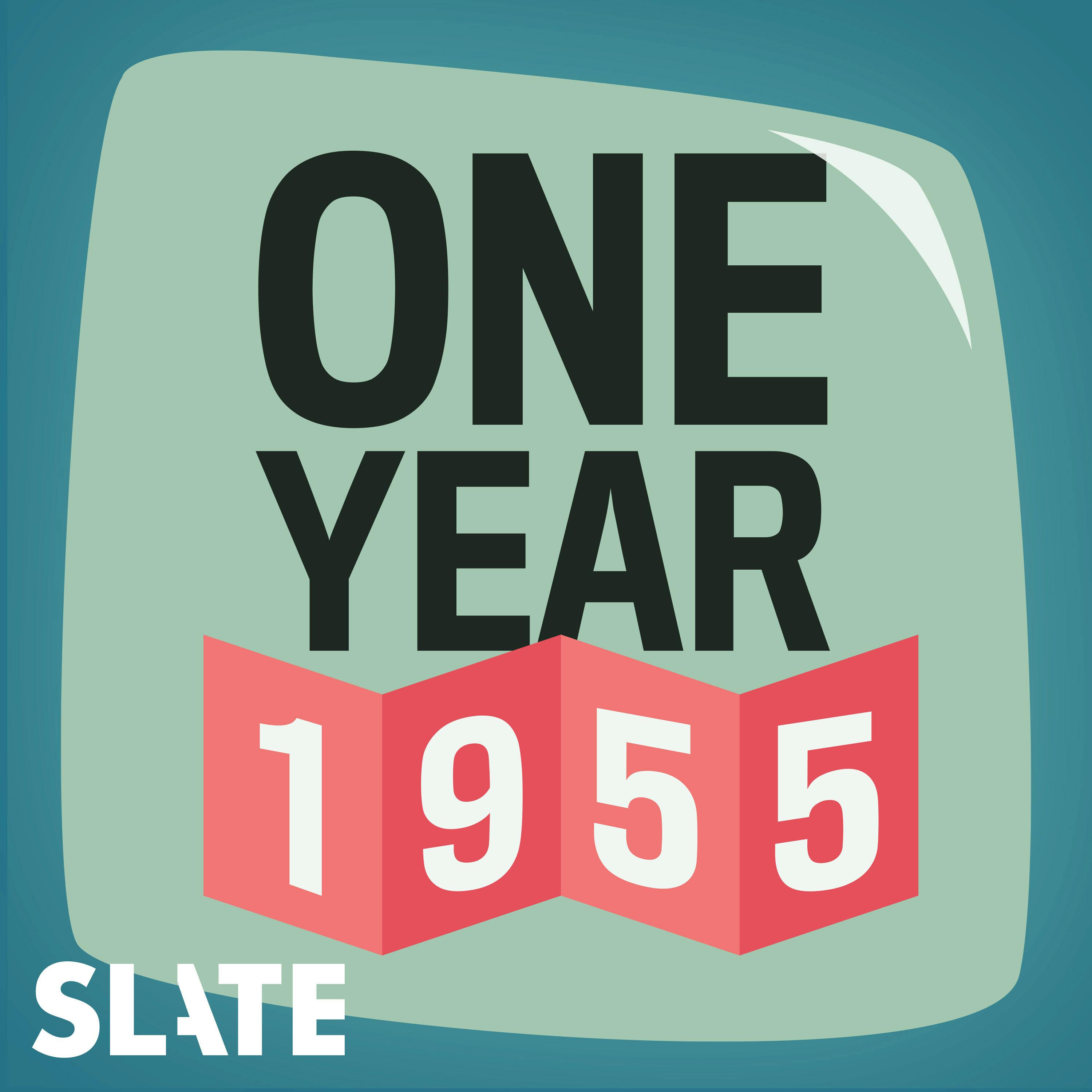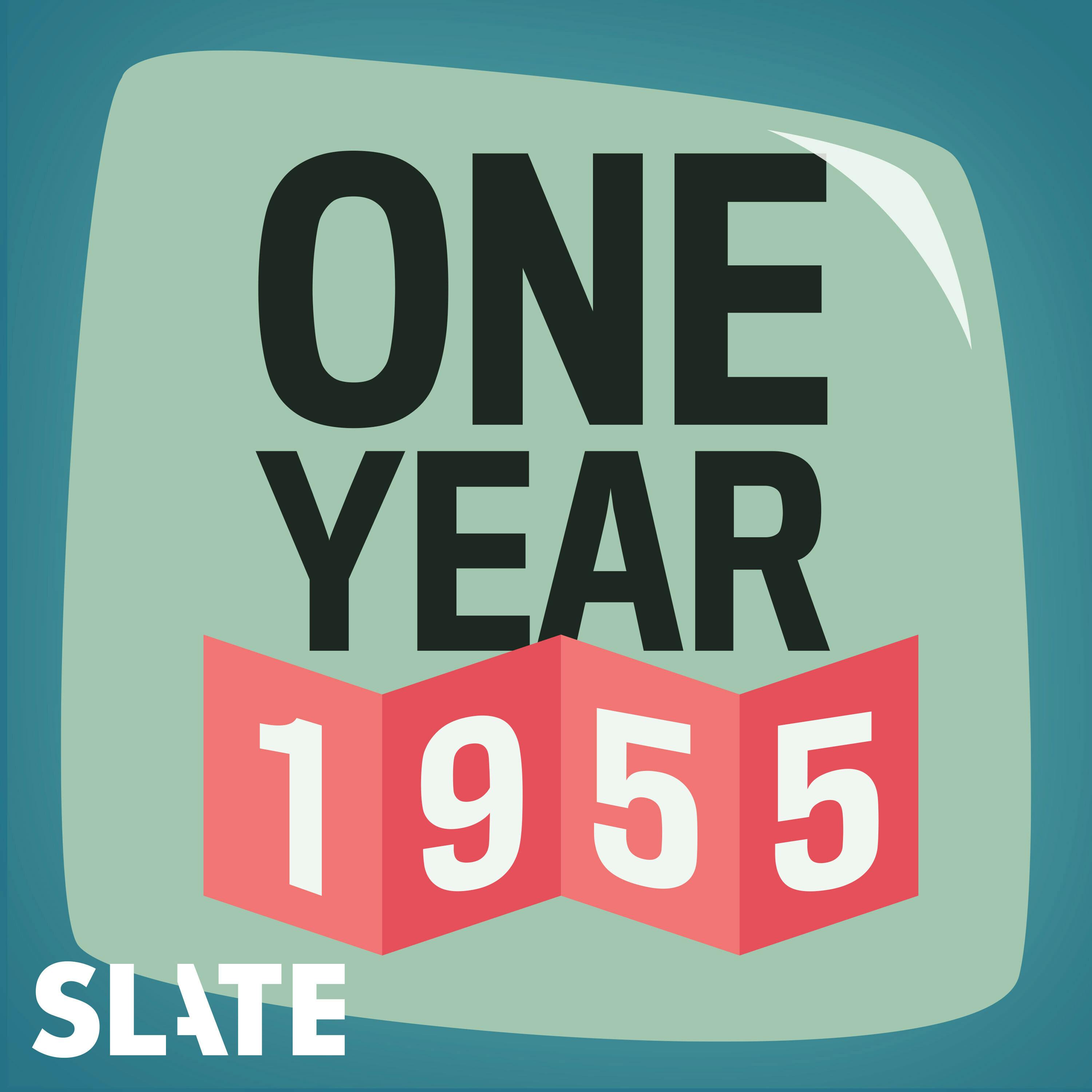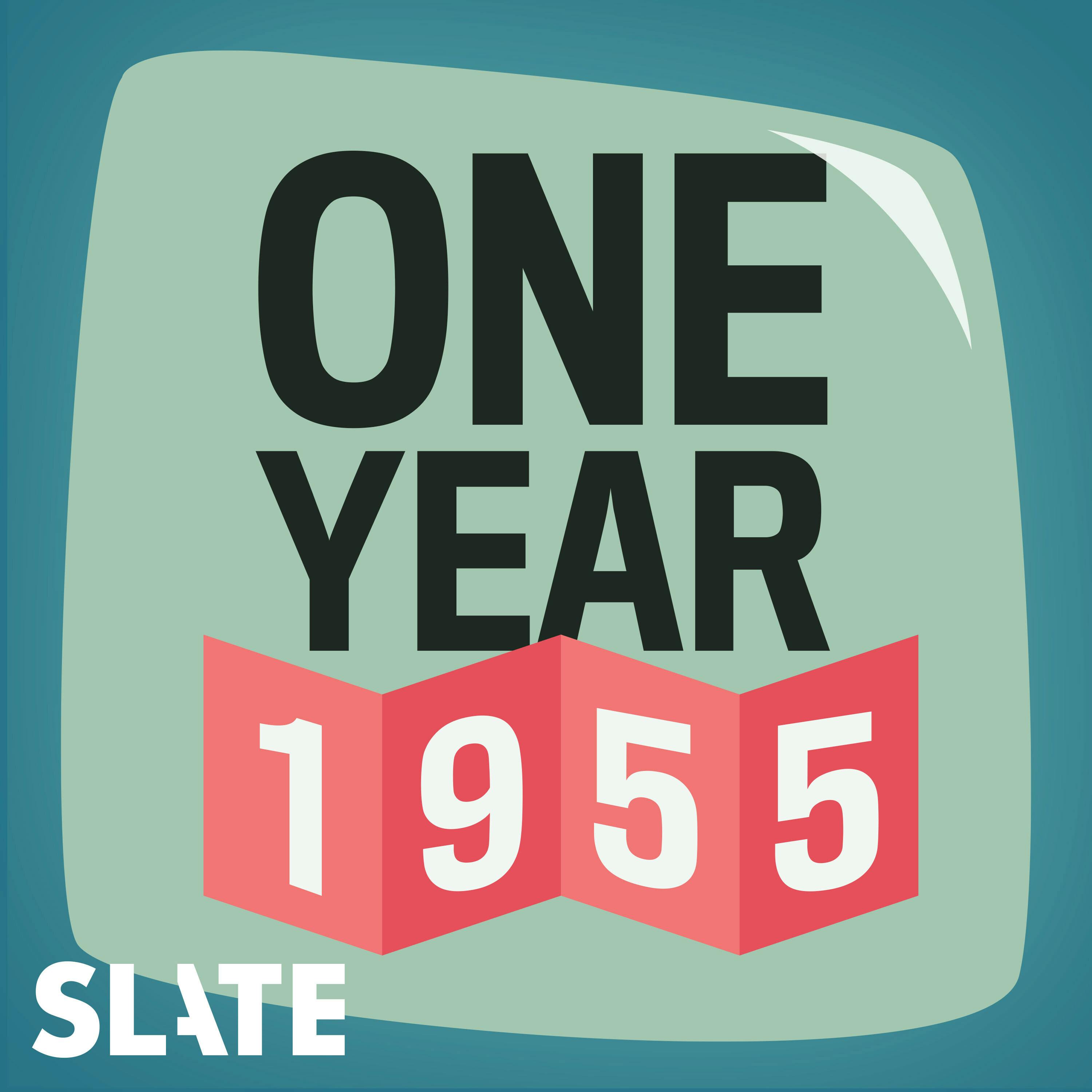Discover Slate History
Slate History

Slate History
Author: Slate Podcasts
Subscribed: 1,054Played: 17,714Subscribe
Share
© Slate Podcasts
Description
A feed with the best history coverage from Slate’s wide range of podcasts. From narrative shows like Slow Burn, One Year, and Decoder Ring, to timely analysis from ICYMI and What Next, you’ll get the fascinating stories and vital context you need to understand where we came from and where we're going.
153 Episodes
Reverse
Join host Joel Anderson and special guests for Slow Burn: Becoming Justice Thomas LIVE in D.C. (July 25, 2023 at 7:30 p.m.)
You’ll see a live performance of an extended story from the season (spoiler: it will be a…slam dunk). You’ll hear even more insights into Clarence Thomas’ life and career—and his decades-long battle with affirmative action. And you’ll watch as Anderson gets grilled about the making of this season and what it was like to interview Justice Thomas’ mother in his childhood home.
Special guests include Thomas’ college friend Eddie Jenkins; legal scholar and MSNBC commentator Melissa Murray; Sen. Sheldon Whitehouse from the Senate Judiciary Committee, and more. (Slate Plus members will receive a discount off your purchase. Use the discount code found on the Events page in your account.)
In addition, please enjoy this bonus conversation with Joel conducted by Slate's Dahlia Lithwick for the Amicus podcast. Joel talks about Clarence Thomas’ anger issues, and what his mother really thinks of Ginni Thomas.
Learn more about your ad choices. Visit megaphone.fm/adchoices
Anita Hill’s accusations launched urgent and heated conversations about racism and sexual harassment. They also stoked an anger in Clarence Thomas that’s never stopped raging.
Season 8 of Slow Burn is produced by Joel Anderson, Sophie Summergrad, Sam Kim, and Sofie Kodner.
Josh Levin is the editorial director of Slow Burn.
Derek John is Slate’s executive producer of narrative podcasts.
Susan Matthews is Slate’s executive editor.
This episode was edited by Josh Levin, Derek John, Sophie Summergrad, and Joel Meyer.
Merritt Jacob is our senior technical director.
Our theme music is composed by Alexis Cuadrado. Artwork by Ivylise Simones.
Learn more about your ad choices. Visit megaphone.fm/adchoices
When Clarence Thomas got nominated to the Supreme Court, his behavior during the 1980s would get put under a microscope. To understand who Thomas was then and who he is today, you need to hear how he treated the women he worked with. You also need to hear from the woman who knew him best during those critical years: his ex-girlfriend Lillian McEwen.
Season 8 of Slow Burn is produced by Joel Anderson, Sophie Summergrad, Sam Kim, and Sofie Kodner.
Josh Levin is the editorial director of Slow Burn.
Derek John is Slate’s executive producer of narrative podcasts.
Susan Matthews is Slate’s executive editor.
This episode was edited by Josh Levin, Derek John, Sophie Summergrad, and Joel Meyer.
Merritt Jacob is our senior technical director.
Our theme music is composed by Alexis Cuadrado. Artwork by Ivylise Simones.
Learn more about your ad choices. Visit megaphone.fm/adchoices
Clarence Thomas went to Yale Law School because he thought it was a good fit for his left-wing politics. But when he got there, it seemed like all the white liberals thought he was only there because he was Black. The sting Thomas felt fueled a lifelong resentment of affirmative action. It also drew him to a group of conservatives who helped sharpen his political beliefs.
Season 8 of Slow Burn is produced by Joel Anderson, Sophie Summergrad, Sam Kim, and Sofie Kodner.
Josh Levin is the editorial director of Slow Burn.
Derek John is Slate’s executive producer of narrative podcasts.
Susan Matthews is Slate’s executive editor.
This episode was edited by Josh Levin, Derek John, Sophie Summergrad and Joel Meyer.
Merritt Jacob is Slate’s senior technical director.
Our theme music is composed by Alexis Cuadrado. Artwork by Ivylise Simones.
Learn more about your ad choices. Visit megaphone.fm/adchoices
Growing up in Georgia, Clarence Thomas wanted to make his mark. His goal was to become his hometown’s first Black Catholic priest. But in the 1960s, he abandoned that dream. Instead, he embraced campus activism and the teachings of Malcolm X.
Season 8 of Slow Burn is produced by Joel Anderson, Sophie Summergrad, Sam Kim, and Sofie Kodner.
Josh Levin is the editorial director of Slow Burn.
Derek John is Slate’s executive producer of narrative podcasts.
Susan Matthews is Slate’s executive editor.
Editorial direction by Josh Levin, Derek John, and Joel Meyer.
Merritt Jacob is Slate’s senior technical director.
Our theme music is composed by Alexis Cuadrado. Artwork by Ivylise Simones.
Learn more about your ad choices. Visit megaphone.fm/adchoices
The team who made Slow Burn: Roe v. Wade tells the story that unfolded behind the scenes of Apple Podcasts' Show of the Year, from the original pitch to the leak of the Dobbs decision. We’ll hear how host Susan Matthews first came up with the idea, how the producers dug up rare archival tape and hard-to-find sources that helped bring the story to life, and how the show tried to fairly represent both sides of the issue. Plus, we dive into what changed after the Dobbs opinion was leaked in May, a month before the show launched. Featuring host Susan Matthews, producers Samira Tazari and Sophie Summergrad, editor Josh Levin, and executive producer Derek John.
To hear all of our Show of the Year Extras visit: https://apple.co/showoftheyear2022
For even more Slow Burn, join Slate Plus. Slate Plus members get exclusive episodes each season. If you’re not already a member, join today and save 50 percent on your first three months.
Learn more about your ad choices. Visit megaphone.fm/adchoices
Before 1990, there had never been a documented case of a patient getting HIV from a health care worker. Kimberly Bergalis changed that. Her claim that she’d been infected by her dentist would captivate and terrify the country. And the dentist, David Acer, would be made into a villain without America ever knowing who he really was.
This episode was written by Kelly Jones and Josh Levin, One Year’s editorial director. One Year’s senior producer is Evan Chung.
This episode was produced by Kelly Jones and Evan Chung, with additional production by Olivia Briley.
It was edited by Joel Meyer and Derek John, Slate’s executive producer of narrative podcasts. Merritt Jacob is senior technical director. We had mixing help from Kevin Bendis. We had production help this season from Jabari Butler.
Join Slate Plus to get a special behind-the-scenes conversation at the end of our season about how we put together our 1990 stories. Slate Plus members also get to listen to all Slate podcasts without any ads.
Learn more about your ad choices. Visit megaphone.fm/adchoices
Robert Mapplethorpe was one of the most famous photographers in the world—and one of the most controversial. When his work came to Cincinnati in 1990, it would be at the center of a vicious fight over obscenity and the First Amendment, one that threatened the future of art in America.
This episode of One Year was written by Evan Chung, One Year's senior producer. It was produced by Kelly Jones and Evan Chung, with additional production by Olivia Briley.
It was edited by Josh Levin, One Year’s editorial director, with Joel Meyer and Derek John, Slate’s executive producer of narrative podcasts. Merritt Jacob is our senior technical director.
Join Slate Plus to get a special behind-the-scenes conversation at the end of our season about how we put together our 1990 stories. Slate Plus members also get to listen to all Slate podcasts without any ads.
Learn more about your ad choices. Visit megaphone.fm/adchoices
In March 1990, a story broke that shocked the nation: George H.W. Bush had banned broccoli from Air Force One. The frenzy that came next would change the fate of a vegetable—and maybe even alter the course of a presidency.
This episode was written by Olivia Briley and Josh Levin, One Year’s editorial director. One Year’s senior producer is Evan Chung.
This episode was produced by Olivia Briley and Kelly Jones.
It was edited by Joel Meyer and Evan Chung.
Derek John is Slate’s executive producer of narrative podcasts.
Merritt Jacob is senior technical director.
Join Slate Plus to get a special behind-the-scenes conversation at the end of our season about how we put together our 1990 stories. Slate Plus members also get to listen to all Slate podcasts without any ads.
Learn more about your ad choices. Visit megaphone.fm/adchoices
A middle-aged single dad in Chicago was outraged by all the cigarette billboards popping up in Black communities. In 1990, he picked up a paint roller and became an anti-tobacco vigilante. And he did it all under a secret identity.
This episode was written by Josh Levin, One Year’s editorial director. One Year’s senior producer is Evan Chung.
This episode was produced by Kelly Jones, Olivia Briley, and Evan Chung. It was edited by Joel Meyer and Derek John, Slate’s executive producer of narrative podcasts.
Merritt Jacob is our senior technical director. We had mixing help from Kevin Bendis.
Join Slate Plus to get a special behind-the-scenes conversation at the end of our season about how we put together our 1990 stories. Slate Plus members also get to listen to all Slate podcasts without any ads.
Learn more about your ad choices. Visit megaphone.fm/adchoices
Pizza Hut’s adventure in the Soviet Union was unlike any restaurant opening before or since. It involved a fleet of submarines, a very special pizza topped with tuna and salmon, and a casual dining spot on a mission to change the world.
This episode was written by Kelly Jones and Josh Levin, One Year’s editorial director. One Year’s senior producer is Evan Chung.
This episode was produced by Kelly Jones and Evan Chung, with additional production by Olivia Briley.
It was edited by Joel Meyer and Derek John, Slate’s executive producer of narrative podcasts. Merritt Jacob is our senior technical director.
Join Slate Plus to get a special behind-the-scenes conversation at the end of our season about how we put together our 1990 stories. Slate Plus members also get to listen to all Slate podcasts without any ads.
Learn more about your ad choices. Visit megaphone.fm/adchoices
A zoopolis is a future society that philosophers envision where wild, domesticated, and denizen animals have full political and legal rights. What would that look like? In this episode, we look at how animals were put on trial in medieval European courts, and how animal rights advocates are bringing animals back into the courtrooms to sue people and the US government.
We then look at what the science of animal minds tells us about how much agency animals have, and envision what political and legal rights various animals would have in a zoopolis. From there, we discuss and debate whether we should be allowed to farm animals, control their reproduction, and have them work for us.
Co-produced with Alec Opperman, guests include historian Gabriel Rosenberg, attorney Monica Miller, and animal minds researcher Professor Kristin Andrews.
Learn more about your ad choices. Visit megaphone.fm/adchoices
Ten years after the atomic bombing of Hiroshima, 25 women who’d been disfigured by the blast came to the United States. Those Japanese survivors would go to the White House and end up on a bizarre proto reality TV show. They’d also put their lives in the hands of American doctors, hoping that risky, cutting-edge surgeries might repair their injuries and give them a chance for a fresh start.
Josh Levin is One Year’s editorial director. One Year’s senior producer is Evan Chung.
This episode was produced by Kelly Jones and Evan Chung, with additional production by Sophie Summergrad.
It was edited by Joel Meyer and Derek John, Slate’s executive producer of narrative podcasts.
Merritt Jacob is our senior technical director. Holly Allen created the artwork for this season.
Join Slate Plus to get a bonus 1955 episode at the end of the season. Slate Plus members also get to listen to all Slate podcasts without any ads. Sign up now to support One Year.
Learn more about your ad choices. Visit megaphone.fm/adchoices
Jonas Salk’s polio vaccine transformed America and the world in ways that seemed unimaginable. But in 1955, there was a moment when everything was in doubt. This week, Josh Levin talks with Dr. Paul Offit about the medical mystery that threatened to derail one of history’s most important scientific breakthroughs.
Josh Levin is One Year’s editorial director. One Year’s senior producer is Evan Chung.
This episode was produced by Kelly Jones, Evan Chung, and Sophie Summergrad.
It was edited by Josh Levin, Joel Meyer, and Derek John, Slate’s executive producer of narrative podcasts.
Merritt Jacob is our senior technical director.
Join Slate Plus to get a bonus 1955 episode at the end of the season. Slate Plus members also get to listen to all Slate podcasts without any ads. Sign up now to support One Year.
Learn more about your ad choices. Visit megaphone.fm/adchoices
When Alaskans wanted their own mental-health facility, a rumor took hold all over America. This week, Evan Chung traces the origins of that far-right conspiracy theory: that the government was building a concentration camp where Americans would get imprisoned for their political beliefs. Get ready for a strange tale that involves a brainwashing manual, Scientology, and a vast network of Communist-hunting housewives.
Josh Levin is One Year’s editorial director. One Year’s senior producer is Evan Chung.
This episode was produced by Kelly Jones and Evan Chung, with additional production by Sophie Summergrad.
It was edited by Josh Levin, Joel Meyer, and Derek John, Slate’s executive producer of narrative podcasts.
Merritt Jacob is our senior technical director.
Join Slate Plus to get a bonus 1955 story at the end of the season. Slate Plus members also get to listen to all Slate podcasts without any ads. Sign up now to support One Year.
Learn more about your ad choices. Visit megaphone.fm/adchoices
In the early days of television, women struggled to find their place. In 1955, they got it: forecasting the weather, on stations all across the country. But as these “weather girls” transformed the airwaves, a group of powerful men hatched a plan—one that had the potential to push women weathercasters off the air forever.
Josh Levin is One Year’s editorial director. One Year’s senior producer is Evan Chung.
This episode was produced by Kelly Jones and Evan Chung, with additional production by Sophie Summergrad.
It was edited by Joel Meyer and Derek John, Slate’s executive producer of narrative podcasts.
Merritt Jacob is our senior technical director.
Join Slate Plus to get the first three episodes of One Year: 1955 right away—and a bonus 1955 story at the end of the season. Slate Plus members also get to listen to all Slate podcasts without any ads. Sign up now to support One Year.
Learn more about your ad choices. Visit megaphone.fm/adchoices
In 1955, the frontiersman Davy Crockett became the most famous man in America, more than a century after his death at the Alamo. This week, Evan Chung dives into a cultural phenomenon nobody saw coming. Not the kids in coonskin caps who started the craze, not the parents whose money fueled it, and least of all Walt Disney, the legendary studio head who created it totally by accident.
Josh Levin is One Year’s editorial director. One Year’s senior producer is Evan Chung.
This episode was produced by Kelly Jones and Evan Chung, with additional production by Sophie Summergrad.
It was edited by Joel Meyer and Derek John, Slate’s executive producer of narrative podcasts.
Merritt Jacob is our senior technical director.
Join Slate Plus to get the first three episodes of One Year: 1955 right away—and a bonus 1955 story at the end of the season. Slate Plus members also get to listen to all Slate podcasts without any ads. Sign up now to support One Year.
Learn more about your ad choices. Visit megaphone.fm/adchoices
The Cannon Street All-Stars dreamed of playing in the 1955 Little League World Series. Their biggest obstacle didn’t come on the field. In the year that Rosa Parks refused to give up her seat on a public bus, these Black 12-year-olds became unlikely civil rights pioneers—and faced the wrath of a white society that wasn’t ready to change.
Josh Levin is One Year’s editorial director. One Year’s senior producer is Evan Chung.
This episode was produced by Kelly Jones and Evan Chung, with additional production by Sophie Summergrad.
It was edited by Joel Meyer and Derek John, Slate’s executive producer of narrative podcasts.
Merritt Jacob is our senior technical director.
Join Slate Plus to get the first three episodes of One Year: 1955 right away—and a bonus 1955 story at the end of the season. Slate Plus members also get to listen to all Slate podcasts without any ads. Sign up now to support One Year.
Learn more about your ad choices. Visit megaphone.fm/adchoices
Coming Thursday, August 31st, the fifth season of One Year covers 1955. A year when a team of 12-year-olds tried to integrate Little League, “weather girls” took the country by storm, and a conspiracy theory about Communist brainwashing infected the nation’s politics.
One Year is history like you’ve never heard it before. In each season, host Josh Levin brings you the weirdest, wildest, and most captivating moments from a single year in American history. You’ll hear stories you may have forgotten and ones you won’t believe you didn’t know, all told by the people who lived through them.
Learn more about your ad choices. Visit megaphone.fm/adchoices
In 1942, federal officials targeted a group of Black Americans who were allegedly hoping for a Japanese invasion. They uncovered a plot that included stockpiles of weapons and secret passwords—but was any of it true? This week, Joel Anderson tells the story of a shadowy organization in East St. Louis, Illinois, the group’s mysterious leader, and an alleged conspiracy against America during World War II.
This episode of One Year was produced by Evan Chung, Sophie Summergrad, Sam Kim, Joel Anderson, Sol Werthan, and Josh Levin.
Derek John is executive producer of narrative podcasts and Merritt Jacob is senior technical director.
Slate Plus members get to hear more about the making of One Year. Get access to extra episodes, listen to the show without any ads, and support One Year by signing up for Slate Plus for just $15 for your first three months.
Learn more about your ad choices. Visit megaphone.fm/adchoices










